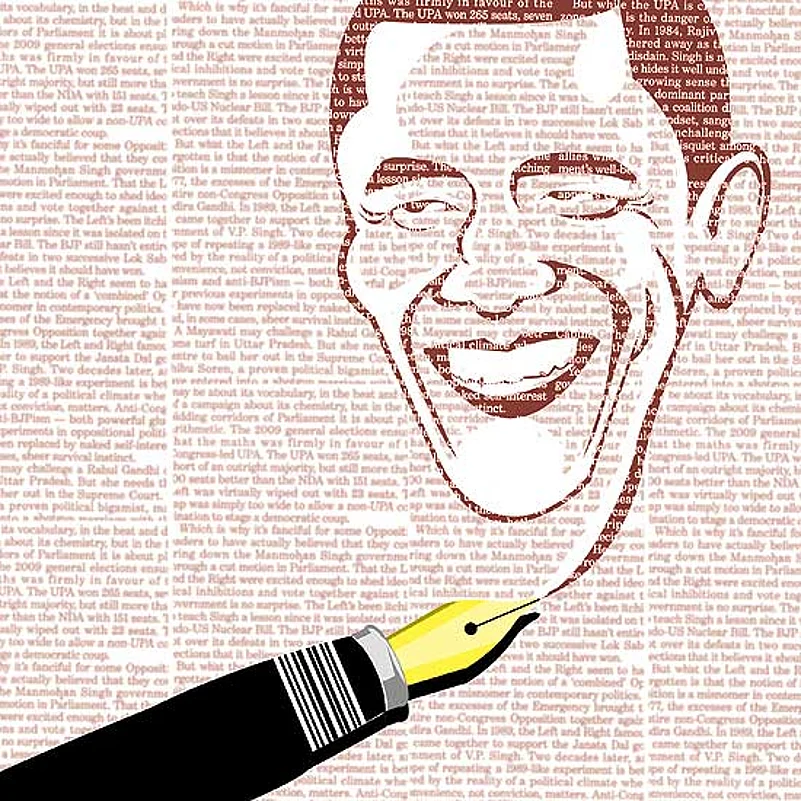Hopelessly bedazzled by the trappings of power, our media mostly projected a fairytale image of President Barack Obama’s visit to India, pushing aside—with a few exceptions—substantive issues and objective analysis. Dished out by an Indian media organisation and lapped up by right-wing talk show hosts in the US, the story about Obama’s India tour costing $200 million (Rs 900 crore) a day may be incorrect and vehemently refuted by White House spokesperson Tommy Vietor, but is a fine example of what our media was looking for in an important diplomatic event.
Though such a wide-eyed look blinks at minutiae, that the presidential visit was an extravaganza is incontrovertible. Obama travelled with hundreds of business leaders, officials, security personnel and journalists. Food was brought over, so were limos; the Americans even hauled along a telephone exchange. And all 537 rooms in the Taj were booked. Vietor refused to give the expense details for fear of revealing how much the visit cost the US taxpayer.
Moreover, as hosts, it cost us a pretty penny too. We refurbished our Parliament building, dressed its staff anew and hired an event management company for the presidential banquet. The Indian media looked askance; when it didn’t, it gloated over the large amounts spent. If our prime minister travelled with a large delegation and booked all rooms in seven-star hotels, a section of our media would have raised Cain. This time over, we were fascinated by the bathtub in the Maurya presidential suite, salivated at its menu, and pranced around and shopped tirelessly with the first lady.
The media lost perspective when it drooled and gushed at the business deals announced by Obama, despite their tokenism. He announced deals worth $10 billion (Rs 44,300 crore approximately) of sales to India—half of them defence-related—that would create all of 54,000 jobs in the US. Obama explicitly said that this would counter the popular perception of India being a poacher of US jobs. Compare these figures with those from the Bangalore Global Investors Meet held in June last, where MOUS worth ten times more, approximately Rs 4,50,000 crore, were signed. Moreover, all this money came into Karnataka alone, that too without the impetus a presidential or prime ministerial push gives. Nevertheless, our media cheered Obama’s announcement, even as businessmen who appeared on TV channels seemed more guarded in their reaction and chose not to read too much into the whole thing. It was for them to follow up the initial euphoria with months and years of hard bargaining with US business leaders.
Declaring the deals a triumph, our media talked about how India was not just a taker from the US, but a giver. Look at China on the other hand. In the recent visit of the French president, China and France signed deals worth $20 billion, twice that of Obama’s deals here, but sans the hoopla. No wonder, China is a far more confident and assertive business partner of the US, with a much better share of its trade than India. In this atmosphere, it was too much to expect from our media to question a US-driven growth model for the world that creates a meagre 54,000 jobs for $10 billion, ensuring growth for corporates, not the aam admi.
And how did the media handle the political, strategic and diplomatic ramifications of Obama’s visit? All the while, we have been bleating that the US should not hyphenate India and Pakistan. Yet, in a virtuoso show of strident contrariness, our media kept on demanding this very hyphenation by harping endlessly after Obama’s speech in Mumbai about how he had let India down by avoiding the P-word and by terming the 26/11 attackers murderers instead of Pakistan-based terrorists. Now that Obama returned to the old Indo-Pak binary while not mentioning China in later addresses, our media should congratulate itself.
Our fondest hopes of superpower status having been stoked by Obama’s favourable comments about India getting a permanent membership of the Security Council, we largely ignored substantive treatment of issues such as the actual process that would bring about a ‘reformed’ Council, and its nature. And what does Obama mean when he hints at the increased responsibilities that come with an increase in power? Does it mean following the US agenda on Iran? After removing our organisations from the entities list and supporting our entry into multilateral bodies like the NSG, the Missile Technology Control Regime, the Australian Group and the Wassenaar Arrangement, what sort of defence or nuclear collaboration does he desire from us? Are we to subordinate our interests to the US agenda or expect America to respect the choices that we deem fit?


























